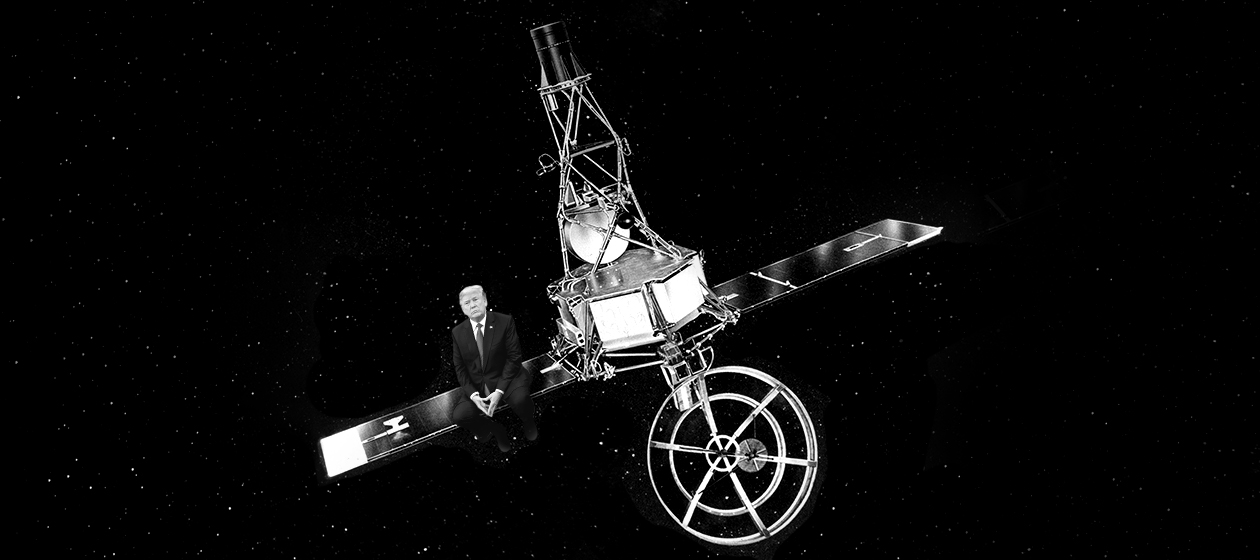6 big questions about Trump's Space Force
How would a federally funded space agency operate, and what would it mean for international relations?


A free daily email with the biggest news stories of the day – and the best features from TheWeek.com
You are now subscribed
Your newsletter sign-up was successful
Virtually no details about President Trump's proposed Space Force exist beyond his ramblings, but if congressional Republicans are willing to back him on prison camps for children, it's hard to see them saying no to this.
Since the U.S. already has NASA, the world's preeminent (and perennially underfunded) space agency, it's worth examining how a new federally funded space organization might affect our civilian pursuits, and what purpose it will hold beyond satellite security. On a long enough timeline, a Space Force is not a wild idea, but there are a few questions worth asking before we prep the celestial battlefield.
1. What is the cultural purpose of a Space Force?
The Week
Escape your echo chamber. Get the facts behind the news, plus analysis from multiple perspectives.

Sign up for The Week's Free Newsletters
From our morning news briefing to a weekly Good News Newsletter, get the best of The Week delivered directly to your inbox.
From our morning news briefing to a weekly Good News Newsletter, get the best of The Week delivered directly to your inbox.
The establishment of the Air Force was about more than generals saying, "Well, planes should have their own branch, too." From formation, the Army Air Corps had its own distinct culture within the wider Army, and with the dropping of the atomic bomb, American air power was more than a weapon in the U.S. arsenal; it was the weapon. By the signing of the National Security Act of 1947, the notion of a subordinate air force was absurd, and an Air Force proper stood up with relative ease. By the early '50s, the Air Force was the backbone of U.S. defense policy.
No such space culture exists in the U.S. military today. To the extent that there is one, it resides in NASA's astronaut corps, the majority of whom are active or retired service members. If Congress follows through with a Space Force, keep an eye on where these astronauts go. If the majority transfer in from the Air Force and Navy, look for a crew-focused Space Force. (These astronauts will, after all, establish the presently nonexistent Space Force culture.) If everyone remains loyal to their respective branches, will computer jockeys fill the void? Such a Space Force might focus on robotic satellite security and cyber warfare.
2. Will they be called astronauts?
This is at once a trivial question and a clarifying one for NASA and the prospective Space Force alike. You won't hear anyone at NASA Johnson Space Center call Dennis Tito, the first "space tourist," an astronaut, even though Tito holds a degree in astronautics, worked for Jet Propulsion Laboratory, and did science experiments on the International Space Station. Compared to "astronaut"-Senator Bill Nelson of Florida, who went to space as a NASA Payload Specialist in 1986, Tito is Grand Space Marshall of the U.S. Star Command.
A free daily email with the biggest news stories of the day – and the best features from TheWeek.com
So will NASA allow non-NASA-trained U.S. Space Force flyers to be called astronauts? Will it even have a choice? The term is guarded jealously by the agency, but a service branch budget could dwarf that of NASA's by a full order of magnitude — and defense dollars always have their way in the end. NASA might soon see "astronaut" demoted to a generic term like "pilot." That will have cultural and political repercussions that should probably be addressed internally at NASA — and soon.
3. Will NASA see research and development benefits from a Space Force?
Build space stations. Launch telescopes. Explore distant worlds. Defend against asteroids. The average person imagines that NASA receives some giant slice of the federal pie, because what the agency does is so spectacular, so well-executed, so permanent. In fact, NASA receives one-half of 1 percent of the federal budget — for everything. That is probably the best-spent money in the federal budget, but it's not nearly enough, which is one reason why projects like crewed lunar return missions take so long to get off the ground.
There's no reason to believe the Space Force or private industry will need something like a Pluto orbiter in the next 100 years. Pure science will always be NASA's domain. And it's a great domain to own! But propulsion, communication, navigation — those are tabs the Space Force can pick up, and whose dividends it can share with NASA. It could be a happy thing indeed for the agency. On the other hand, if NASA is somehow saddled with research and development responsibilities for the Space Force (in the interests of national security, of course — national security defined as whatever Trump wants it to be), science can suffer. There is precedence for that: In 2014, Russia invaded Ukraine and the U.S. banned Russian-made RD-180 rocket engines in retaliation. The OSIRIS-REx spacecraft, set soon to arrive at the asteroid Bennu, thus saw its rocket engine seized by the Air Force for a "national priority" military launch.
4. Will the Space Force have independent, crewed space missions?
The majority of NASA's present astronaut corps came by way of the military. If the Space Force occupies itself with Earth-based satellite (and possibly cyberspace) operations, there's no reason that the military tradition wouldn't continue, with six branches feeding the agency astronaut candidates rather than five. NASA operations might be unaffected entirely. But does Trump imagine a Space Force with X-wing Starfighters, or does he dream of computer console operators? Because this whole thing is being pushed by him, and because his acolytes all but guarantee he'll serve at least two terms, will he be satisfied with a Space Force that doesn't go to space?
Will the Space Force build its own hardware and launch its own people for its own missions? And if so, what will they do up there?
5. What will the Space Force build?
In 1959, the Army wanted to build its own moon base. The Department of Defense might get its chance yet. NASA can't afford a moon base. But the Defense Department could build a moon metropolis. NASA's entire annual budget is less than the rounding errors in the defense budget. A Space Force Corps of Engineers prepping cis-lunar infrastructure wouldn't be the worst way to spend those defense dollars, and would give NASA some breathing room to keep the International Space Station aloft and simultaneously do the sort of deep space exploration that industry will not.
It all comes back to this question: What will a Space Force do? Astronauts at the top ranks of NASA might make the branch more Starfleet than Imperial Navy. Because "national security" is a meaningless phrase that fills every box, isn't careful understanding of humankind's precarious place in the solar system a national security issue? Isn't human survival itself a pressing need? Everyone would come out ahead with a Space Force led by explorers rather than warriors.
6. What will the Space Force inspire around the world?
If the Space Force is spacefaring with its own crewed space missions, will it train its own astronauts (or whatever they are called)? What specific training and purpose would a spacefaring Space Force serve that NASA's astronaut corps does not? On one hand, it is a fine thing to permanently separate defensive/offensive/intelligence space operations from NASA and l leave loftier human goals to the agency. On the other hand, when it comes time to cut budgets, loftier human goals are an easy ax for short-sighted lawmakers. ("Why are we spending money on Mars rovers when Chinese missiles threaten our children?")
So does a U.S. Space Force motivate our enemies? Does it put satellites officially on the table in an armed conflict? What about astronauts? Or does it inspire allies to get on board and pump money into space technology? All of our (former) friends have nice nuclear arsenals and mighty fine air forces, after all. Can you even call yourself a first world country if you don't have a Space Force?
David W. Brown is coauthor of Deep State (John Wiley & Sons, 2013) and The Command (Wiley, 2012). He is a regular contributor to TheWeek.com, Vox, The Atlantic, and mental_floss. He can be found online here.
-
 Palantir's growing influence in the British state
Palantir's growing influence in the British stateThe Explainer Despite winning a £240m MoD contract, the tech company’s links to Peter Mandelson and the UK’s over-reliance on US tech have caused widespread concern
-
 Quiz of The Week: 7 – 13 February
Quiz of The Week: 7 – 13 FebruaryQuiz Have you been paying attention to The Week’s news?
-
 Nordic combined: the Winter Olympics sport that bars women
Nordic combined: the Winter Olympics sport that bars womenIn The Spotlight Female athletes excluded from participation in demanding double-discipline events at Milano-Cortina
